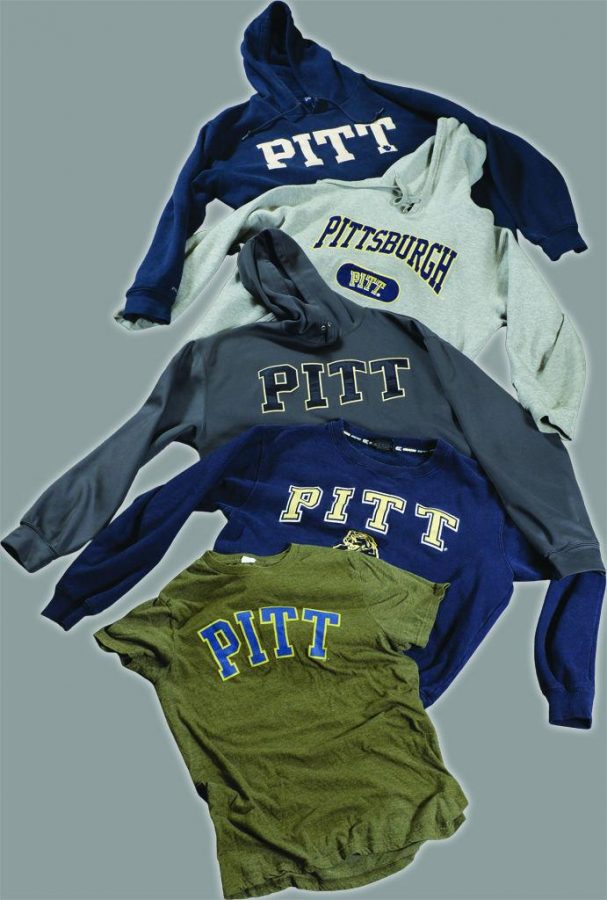Safer spirit wear: Pitt agrees to workers’ rights accord for apparel licensees
August 25, 2014
After a year of student pressure, Pitt will require its apparel licensees to sign a legal document agreeing not to manufacture products in unsafe working environments.
The Accord on Fire and Building Safety in Bangladesh aims to prevent accidents like the collapse of a Bangladeshi garment factory in April 2013. The accord promotes a garment industry “in which no worker needs to fear fires, building collapses, or other accidents that could be prevented with reasonable health and safety measures.” More than 1,000 workers died in the collapse of the factory at Rana Plaza in Bangladesh, a country with significantly unsafe factories.
“[The accord] has certain mechanisms that force companies to finance the repair and upkeep of their factories and also empowers employees by allowing them to form unions,” said Dolly Prabhu, president of Pitt’s Americans for Informed Democracy (AID).
The University sent a letter to its licensees on Friday, Aug. 22, according to vice chancellor of communications Ken Service. If Pitt’s partners do not sign the accord, Service said “they will no longer do business with Pitt.”
The University looked over the conditions of the accord, Service said, and agreed that it was time to sign the document and force those who produce Pitt products to do the same. Licensees will have until Oct. 1 to sign the accord, according to an AID release last week, but Service said he wasn’t aware of a specific deadline for licensees to sign the accord by.
Students from AID, the leading group of the No Sweat: Pitt Coalition Against Sweatshops, met with University administration several times last year to urge Pitt officials to sign the accord. The No Sweat: Pitt Coalition Against Sweatshops is a conglomerate of Pitt student groups who work together to ban sweatshops worldwide. In April, students from the coalition staged a successful die-in on the William Pitt Union Lawn, during which they lied down to make their bodies represent those who died in the factory collapse.
Last year, Pitt AID invited Reba Sikder, a survivor of the Bangladeshi factory collapse, to speak at Pitt about her experiences. For one AID member, Sikder’s speech was an impetus to get more involved in supporting workers’ rights issues.
“The entire story was very heartbreaking,” said Mihir Mulloth, a junior chemistry and neuroscience major. “She was only 18 years old. Many of us are applying to college at 18 and she was watching people she’s worked with for months or years just die in front of her.”
After two semesters of dropping off baked goods, letters and petitions with more than 160 student signatures, the students from Pitt AID met with administration in April.
“We were told the review of the Accord was going in a positive direction, but no more than that,” Prabhu said of the meeting.
While AID members were initially frustrated with the lack of indication that the administration had read or received their petitions and letters, former AID president Erin Shields said negotiations advanced after the students made it clear that student interest was high.
Last August, the University signed on with the Worker Rights Consortium, an organization that fights for labor rights in factories worldwide. The Worker Rights Consortium drafted the accord in conjunction with many other organizations in response to the 2013 factory collapse.
“We worked very hard to get them to sign on to that,” said Shield, a senior history and political science major. “They’re trusting this organization to make these recommendations that will ultimately ensure that their apparel doesn’t come at the expense of workers around the world.”
To continue their student activism, Prabhu said the next step for AID will be to continue monitoring the Worker Rights Consortium and “making sure Pitt is doing as much as possible to ensure the ethical production of Pitt apparel.”
“For instance, we are also promoting the sale of Alta Gracia brand clothing at the University Store, because it is produced in a living wage factory,” Prabhu said.
Throughout the negotiations, Shields and the other AID members learned how the administration works, boosting her hopes that “this cooperation can extend to other student groups as well.” Shields said she “briefly and informally” met with dean of students Kathy Humphrey to discuss a possible labor rights committee at Pitt, but that the group hasn’t really had a chance to convene and talk about what comes next after the University signed the accord.
“Us pushing for the accord is part of the larger mission that Pitt stands by the Worker Rights Consortium and makes decision that are both smart and ethical, and using our power as students in order to influence that,” Shields said.



